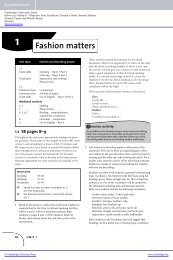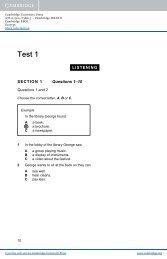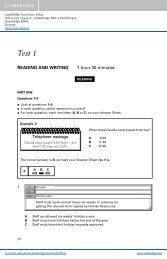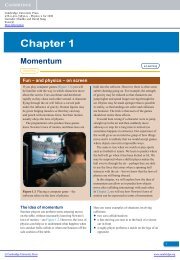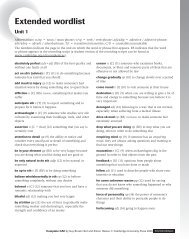Skills for Study Level 2 Teacher's Book - Cambridge University Press
Skills for Study Level 2 Teacher's Book - Cambridge University Press
Skills for Study Level 2 Teacher's Book - Cambridge University Press
Create successful ePaper yourself
Turn your PDF publications into a flip-book with our unique Google optimized e-Paper software.
Quite separately from the issue of low expectations, Clark and Oswald (ibid)suggest that another possible reason <strong>for</strong> women’s higher job satisfactiondespite lower earnings is because men and women value specific aspects oftheir work, such as pay or flexible work arrangements, differently (Clark, 1997).However, it is again unlikely that this is sufficient explanation <strong>for</strong> the gendersatisfaction gap, and may even underestimate the importance of the similaritiesbetween the genders. In a study of job attitudes among US lawyers, Muellerand Wallace (1996) find that the perception of fair pay between male and femaleworkers is a significant element of female job satisfaction 4 .Furthermore, women’s work experience levels are not uni<strong>for</strong>m; <strong>for</strong> instance,younger female workers tend to have work experiences and expectations whichare similar to male colleagues of the same age. This is particularly evidentamong workers in professional jobs and with higher education (Royalty, 1998),which would seem to be supported by the findings of Mueller and Wallace (ibid).It there<strong>for</strong>e seems that different job expectations cannot account fully <strong>for</strong> thegender / job-satisfaction difference 4 .In conclusion, there is widespread agreement that a gender / job-satisfaction gapdoes exist. Following early studies by Clark and others (see, <strong>for</strong> example, Hodson,1989) it has long been assumed that this is a result of male and female workershaving different expectations of their career success, or indeed having significantlydifferent opinions about what aspects of a job are important <strong>for</strong> a feeling ofcontentment. However, these theories are challenged by studies which show thatlevels of expectation differ between women of different age, occupational type andeducational level. While most studies of age-dependent differences of expectationshave been carried out in the United States, little has yet been done to investigatewhether this is true in the UK. The aim of the present study, there<strong>for</strong>e, is to explorein more detail whether young female workers in the UK share career progressexpectations with their male colleagues 5 .3b Students check their answers with a partner.3cAnswersStructured by topic3dAnswersaOccupational type and job satisfaction – A, B, CFemale-dominated workplaces – DIdeas or expectations about men’s and women’s work – A, BbSources A, B, C and D all share the claim that women’s expectations aredifferent to men’s.cSources A and C indicate higher female job satisfaction, while Source Bsuggests it’s lower in some countries.3e Students create a literature review of their own using the sources in 3d.Unit 1 Part E ∙ Reporting in writing 34





